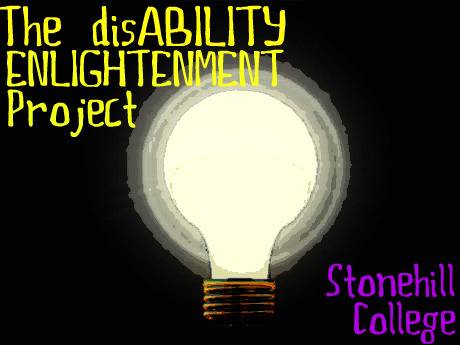
So the other week at one of our meetings the topic of disability simulation activities came up when we were brainstorming ideas for our booth at the body fair on Wednesday. For those of you who don't know, a disability simulation activity is where people get the opportunity to "try on a disability." It is oftentimes done by disability rights groups and usually entails having people "test out wheelchairs" or get blindfolded to "know what it's like to be blind."
When I was working in DC I attended a hearing and vision loss support group where the discussion leader had us all put on these glasses that caused us to have limited vision and put ear plugs in our ears. She then gave us all a different task to do- I think mine was searching for a phone book and looking up a particular number. I understand that her intentions were good- she wouldn't be leading a hearing and vision loss support group if they weren't, but I really think these simulations aren't the greatest of ideas.
I know I came out of that exercise feeling frustrated and discombobulated. Also oftentimes people will come out of those simulation activities thinking to themselves "gosh, I'm glad I am not stuck in a wheelchair all day" or "I feel sorry for people who are blind."
Feelings of pity or "glad that's not me..." are not the aim of disability rights advocates. Spending 15 minutes blindfolded or even a whole week in a wheelchair are not going to give a person a true sense of what it feels to be disabled. Pity is the last thing disability rights advocates want people to feel. Also these exercises also seem to be almost mocking in nature?
I found this article to have some pretty interesting insight on the subject of disability simulations. The author, Brew-Parrish, explained, "I AM BAFFLED AS TO WHY nondisabled people see a need to simulate a disability in order to understand our situation. Across our nation in February, we celebrate Black History Month. Is it necessary for people with white skin to paint their faces black to better understand this minority? Should heterosexuals be asked to experience homosexuality so we are not homophobic?"
I feel like we do not need to experience something in order to understand it. Yet we also need to be realistic in saying that there is no way we can truly understand what anybody else is experiencing in his or her life, and that has absolutely nothing to do with disability. I don't have the capability to physically enter into someone else and view the world from their body. I can try to "walk a mile in someone else's shoes" in a purely mental sense and work as best I can to learn about others, but there is no activity in the world that can let people experience what it feels like to be someone else.
Anyway, I hope you all liked this post! Let me know if you have any input or want to write a post of your own.
Stonehillers, don't forget about "OUR DAY" (a day of advocacy for the deaf, deaf-blind, and hard-of-hearing) at the State House tomorrow and a meeting in the group center in the lower commons tonight!
